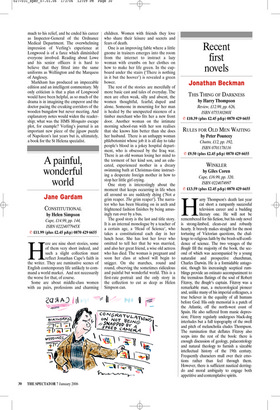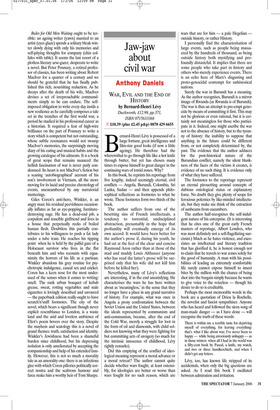Recent first novels
Jonathan Beckman
THIS THING OF DARKNESS by Harry Thompson Review, £12.99, pp. 626, ISBN 075530280X V £10.39 (plus £2.45 p&p) 0870 429 6655 RULES FOR OLD MEN WAITING by Peter Pouncey
Chatto, £12, pp. 192, ISBN 0701178116
V £9.50 (plus £2.45 p&p) 0870 429 6655 WINKLER by Giles Coren Cape, £16.99, pp. 320, ISBN 0224074997 V £13.59 (plus £2.45 p&p) 0870 429 6655 Harry Thompson’s death last year cut short a rampantly successful television career and a budding literary one. He will not be remembered for his fiction, but his only novel is strong-limbed, clean-cut and robustly hearty. It bravely makes straight for the most torturing of Victorian questions, the challenge to religious faith by the brash self-confidence of science. The two voyages of the Beagle fill the majority of the book, the second of which was accompanied by a young naturalist and prospective churchman, Charles Darwin. He is a formidable antagonist, though his increasingly sceptical rumblings provide an ostinato accompaniment to the tremulous flutings of the soul of Robert Fitzroy, the Beagle’s captain. Fitzroy was a remarkable man, a meteorological pioneer and, unlike many of his imperial colleagues, a true believer in the equality of all humans before God. His only memorial is a patch of the Atlantic, off the north-west coast of Spain. He also suffered from manic depression; Fitzroy regularly undergoes black-dog interludes but a full topography of the swell and pitch of melancholia eludes Thompson. The rumination that deflates Fitzroy also seeps into the rest of the book: there is enough discussion of geology, palaeontology and natural theology to furnish a sizeable intellectual history of the 19th century. Frequently characters mull over their emotions rather than feel through them. However, there is sufficient nautical derringdo and moral ambiguity to engage both appetitive and contemplative spirits. Rules for Old Men Waiting ought to be terrible: an ageing writer (yawn) married to an artist (eyes glaze) spends a solitary bleak winter slowly dying with only his memories and self-pitying thoughts for company (chin collides with table). It seems the last resort of a plotless literary arse-gazer, desperate to write a novel. But Peter Pouncey, a retired professor of classics, has been writing about Robert MacIver for a quarter of a century and we should be grateful that he has finally published this rich, nourishing reduction. As he decays after the death of his wife, MacIver devises a set of irreproachable commandments simply so he can endure. The selfimposed obligation to write every day instils a new resilience as he carefully composes a tale set in the trenches of the first world war, a period he studied in his professional career as a historian. It required a feat of high-wire brilliance on the part of Pouncey to write a story which is competent but not outstanding, whose subtle resonances would not swamp MacIver’s memories, the surprisingly moving diary of his eating and musical habits and the growing catalogue of his ailments. It is a book of great scope that remains nuanced: the hellish fascination of war is never patly condemned. Its heart is not MacIver’s fiction but a searing ‘autobiographical’ account of his son’s involvement in Vietnam, all the more moving for its lucid and precise chronology of events, unencumbered by any narratorial mutterings.
Giles Coren’s anti-hero, Winkler, is an angry man: his residual peevishness occasionally inflates as far as eye-popping, furnituredestroying rage. He has a dead-end job, a corpulent and irascible girlfriend and lives in a house that perpetually reeks of boiled human flesh. Doubtless this partially contributes to his willingness to push a fat lady under a tube train. He reaches his tipping point when he is held by the pallid gaze of a Holocaust survivor who lives in the flat beneath him and who recounts with equanimity the horrors of his life as a partisan. Winkler abandons his grey routine for psychotropic indulgence, casual sex and cricket. Coren has a keen nose for the most underused of the senses when it comes to writing: smell. The rank urban bouquet of kebab grease, sweat, rotting vegetables and stale cigarettes is lovingly described and savoured — the paperback edition really ought to have scratch’n’sniff footnotes. The city of the novel, which bears a significant though never explicit resemblance to London, is a waste land and the arid and loveless ambience of Eliot’s poem hovers over the story. Despite the mayhem and scatology this is a novel of grand themes: truth, satisfaction and identity. Winkler’s Jewishness had been a shameful burden since childhood, but his depressing isolation is only ameliorated by accepting the companionship and help of his extended family. However, this is not so much a morality tale as an amorality one: there is an infectious glee with which Coren pillories politically correct nostra and the scabrous humour and farce make him a worthy heir of Tom Sharpe.






































 Previous page
Previous page